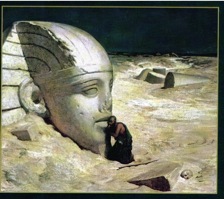The Bill of Rights to the Constitution was written by men who had seen change within their own lives. Moreover, they had been key players in some of the most profound changes for all citizens at that time. They were a curious mixture of educated farmers and even better educated statesmen. They read history and derived from it the principles on which the Constitution was ultimately founded. To those men, the evolution of what defined both freedom and intrinsic rights was as plain as the words they read of their own origins. These men understood change and while perhaps could not imagine the tremendous changes of the past two centuries, did foresee change as being a part of society.
Rights to free expression are ostensibly without limit, yet practicality and the court system have said otherwise. No speech can be totally free without some burden of responsibility and accountability placed upon the speaker. So too with the restriction on government policies which address one religion over another. The last few decades have seen too many examples of religious faith twisted into a mind control that results in the deaths of adherents. Thus, it is in the open-ended and vague simplicity of how the Bill of Rights was constructed that reveals the true brilliance of its writers.
Just as the founders could not envision a court case addressing whether one has the right to shout fire in a crowded theater, so too could they not foresee the technological advances which have resulted in the variety and exponentially increased lethality of guns. At the time of America's founding, guns used by farmers for hunting and protection were nearly identical in power and operation of those used by the military. Indeed, it was those same farmers who were able to successfully fend off a seasoned British military using the same kind of guns yet differing tactics.
Thus, as the right to free expression has been curtailed by the evolution of what is considered expression, so too must the right to own a gun fall under the same scrutiny of what is best for the society now as opposed to the speculated intentions of the founders. The Constitution does indeed call those rights self-evident yet contains the mechanisms whereby those rights are interpreted for a differing age. The founding fathers stipulated nothing in the documents they passed to us which gives any indication they intended to stand as interpreters of American law for all times. The judicial branch has that task and was given extraordinary leeway in making judgments which best fit America at any given time.
This has resulted in gun laws which are decried by some as being against the non-existent intent of the founders that all arms be allowed and yet are judged to be Constitutional or not by the very body the founders intended for the purpose. To that end, America is blessed with a Constitution which allows for the dynamics of a growing and changing society. It is indeed a living, breathing document which continues to be read against the backdrop of what constitutes justice for contemporary society rather than adhering to ideals of an American culture from two centuries past.
11/19/2006
Subscribe to:
Post Comments (Atom)


No comments:
Post a Comment